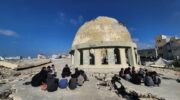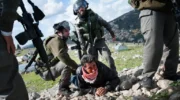Troves of looted Palestinian books, documents, photographs and films from as early as the 1930s are sealed in Israel’s archives and libraries. Palestinians see the censorship as part of a wider trend of physical and cultural erasure continues to this day. Concealing the archival record denies Palestinians the tools to communicate their own history.
from Al Jazeera
Sealed in Israel‘s archives and libraries are troves of Palestinian books, documents, photographs and films that were looted from Palestinian institutions and personal archives by Jewish militias and later, the Israeli military.
“This confiscation is a kind of daily struggle that Palestinians face,” says Sherene Seikaly, a scholar of Middle Eastern history. “One of the reasons, that these archives are a target, that they’re threatening, is because they’re really a record of Palestinian social life, and Palestine more broadly.”
Israeli historian Rona Sela has spent 20 years uncovering Palestinian visual history that has been kept in the dark in Israel’s state and military archives. She says the methodical plunder of Palestinians‘ cultural assets predates the establishment of the state of Israel in 1948, what Palestinians call the ‘Nakba‘ or ‘catastrophe.’
“The looting and seizure, as far as I found, started in the 1930s in a systematic and organised manner … by Haganah forces [Zionist paramilitary group]. The seizure intensified, of course, with the Nakba in 1948. I found materials taken in 1967, 1982, 1991 and … in the last few years.”
What begins with looting and appropriation, continues with a system of censorship and historical revisionism in the archives. The origin of Palestinian material is often erased and replaced with terminology that fits the archivist’s world view.
“I saw photos with comments and notes written on them by the censors and archivists. For example, Palestinians are described as ‘terrorists’, as ‘gangs’. Seeing all of that taught me about how the materials go through a process of rewriting to aid or benefit the Zionist narrative,” says Sela. “You see a place where the materials are being censored and erased from the public sphere.”
The suppression of history doesn’t only extend to Palestinian material. The Israeli archives also guard state secrets that could reveal details about Israel’s treatment of Palestinians.
Historians and journalists say the policy of censoring incriminating material in the archives exposes the deep insecurity Israel has about its past, with archivists employed as the ‘gatekeepers’ of history.
“Israel is terrified of the contents of its own archives, and doesn’t want its history to be exposed,” says Mahmoud Yazbak, a professor at the University of Haifa. “The government’s … aim is to hide the past from researchers in order to prevent it from being part of the present and the future.”
Palestinians see the censorship as part of a wider trend of physical and cultural erasure that began in 1948 and has continued ever since. Concealing the archival record denies them the tools to communicate their own history, what the Palestinian intellectual and literary theorist Edward Said called “permission to narrate.”
“The fact that these documents have been taken away from Palestinian hands is a sign of contempt for Palestinian history,” says Yazbak. “It’s an attempt to suggest Palestinians have no history, no documents, no belongings.”
The Listening Post‘s Tariq Nafi looks at the silencing of Palestinian history in Israel’s archives.
Contributors
Sherene Seikaly – associate professor, UC Santa Barbara
Rona Sela – Israeli researcher on visual history and lecturer
Mahmoud Yazbak – professor, University of Haifa
RELATED READING:
The Real Story of How Israel Was Created (It wasn’t the UN)
Aftermath Of Israeli Strikes Proves Israel Is Targeting History, Culture And Ordinary Civilians




